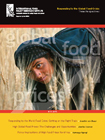October 2008: The International Food Policy Research Institute (IFRPI) has published three essays addressing critical questions regarding policy responses to the current food crisis.
The essays by Joachim von Braun, IFPRI Director General, Josette Sheeran, Executive Director of the UN World Food Programme (WFP), and Namanga Ngongi, President of the Alliance for a Green Revolution […]
 October 2008: The International Food Policy Research Institute (IFRPI) has published three essays addressing critical questions regarding policy responses to the current food crisis. The essays by Joachim von Braun, IFPRI Director General, Josette Sheeran, Executive Director of the UN World Food Programme (WFP), and Namanga Ngongi, President of the Alliance for a Green Revolution in Africa (AGRA), point to the dangers and pitfalls of misguided policies, but also to the potential opportunities for responding in a way that prevents future crises and ensures food security in the long term. In addition to the most pressing questions of delivering immediate relief to populations affected by hunger and the strategic issues of the long-term stabilization of food production and food markets, the essays also address impacts of current biofuel policies and climate change on agriculture.
October 2008: The International Food Policy Research Institute (IFRPI) has published three essays addressing critical questions regarding policy responses to the current food crisis. The essays by Joachim von Braun, IFPRI Director General, Josette Sheeran, Executive Director of the UN World Food Programme (WFP), and Namanga Ngongi, President of the Alliance for a Green Revolution in Africa (AGRA), point to the dangers and pitfalls of misguided policies, but also to the potential opportunities for responding in a way that prevents future crises and ensures food security in the long term. In addition to the most pressing questions of delivering immediate relief to populations affected by hunger and the strategic issues of the long-term stabilization of food production and food markets, the essays also address impacts of current biofuel policies and climate change on agriculture.
Von Braun states that the “surging appetite for biofuels in Europe and the US” has substantially contributed to rising demand for agricultural products. He adds that “farmers will therefore have to meet growing food and energy needs while coping with increasingly scarce water supplies and more variable and extreme weather caused by climate change.” He recommends: freezing biofuel production at current or reduced levels, or imposing a moratorium on biofuels based on grains and oilseeds; integrating new biofuel policies with food security strategies; and supporting biofuels based on non-food feedstocks. Sheeran notes that hunger as a consequence of climate-related disasters is likely to increase in the future and draws attention to WFP’s increased emphasis on disaster preparedness and mitigation, as reflected in the Programme’s strategic plan for 2008-2011. Ngongi addresses the role of biotechnology and genetically modified organisms (GMO) in efforts to increase and stabilize yields. He argues that, while conventional breeding will help bridge the productivity gap in Africa in the short term, climate change will, in the long run, require the use of biotechnologies and GMOs for variety improvement and for rapid propagation, multiplication and production of planting material. [The essays]